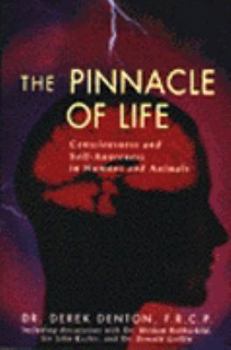The Pinnacle of Life: Consciousness and Self-Awareness in Humans and Animals
The unravelling of the nature of consciousness - the awareness of being alive - is the ultimate challenge to the enquiring mind and has preoccupied poets, philosophers, writers and scientists... This description may be from another edition of this product.
Format:Paperback
Language:English
ISBN:0062511246
ISBN13:9780062511249
Release Date:January 1994
Publisher:HarperOne
Length:250 Pages
Weight:0.65 lbs.
Dimensions:0.7" x 5.3" x 8.0"
Customer Reviews
2 ratings
An older, very interesting examination of consciousness.
Published by Thriftbooks.com User , 22 years ago
Dr. Denton is a keen biological observer (a physiologist by trade) of the phenomenon of consciousness both human and animal. Two things about this book that make it a worthwhile purchase. First is the discussion of experiments conducted on secondary awareness, or self-awareness as performed on higher primates. Second is Denton's interview with one of the last great metaphysical dualists known in our time, Sir John Eccles. His interview with natural historian Miriam Rothschild is very insightful reading as well.Denton seriously wants to know how mammalian neural machinery gives rise to what we call human consciousness and what its precursors are in our animal cousins. His work parallels that of American Gerald Edelman in some respects as the two scientists make hay of primary, sensual consciousness in contrast to secondary, cognitive awareness of primary sensual consciousness; otherwise known as self-awareness. Edelman goes into more detail but Denton fairly covers the gist of this distinction.Denton is clearly a materialst in his scientific view of brains and how they give rise to consciousness. He clearly states so when he ventures "consciousness is indivisibly a function of the brain...without the function of the brain there is no mind, no consciousness...no soul...if a person is inseperablem from his brain it is senseless to ask which of them controls the other." Obviously neither controls the other, they are one. Long live the death of mind/body dualism; if only our species could just make it over that one little hurdle. With Denton however, we have a monistic materialist at the helm; always an edifying prospect.He runs through the standard litany of neuroanatomy and neurophysiological diagrams and definitions, attending well to the important RAS, reticular activating system in the brain stem which coordinates the lower, unconscious neural functions with the upper, corticallly conscious neural systems. This trails off into case studies of hemispheric differentiation and REM dream function; studies on the adaptive function of why we dream.Denton covers his share of philosophy and animal correlates in this relaxing little book. The book ends merrily with interviews of naturalist Miriam Rothschild, Nobel Prize winning biologist Sir John Eccles, and Dr Donald Griffith. A fine, unpretentious essay on human and animal consciousness and its probable neural correlates, with some astounding interviews by some astounding people.
Consciousness is an evolutionary advantage
Published by Thriftbooks.com User , 22 years ago
This book presents both monoist (spirit and brain are one) and dualist (spirit is independent but connected to the brain) theories of the brain-spirit problem but clearly favors the monoist one. The author presents the consciousness (and self-consciousness) as an evolutive advantage.The book includes a lot of explanations, experiments and anecdotal stories about the human brain to show that consciousness is directly related to the brain and how some high-level functions of the mind are mapped to different regions of the brain. The author demonstrates empirically that many animals are conscious and some are even self-conscious. There are plenty of examples of fascinating animal behaviours showing this. The book is also filled with citations and extracts of literature and poetry which make this book not only of an academic nature but also very enjoyable to read.The appendix contains transcribed interviews with Miriam Rothschild, Sir John Eccles and Dr Donald Griffin. The bibliography is adequate (~75 entries) but the text does not refer to the entries - the entries are said to have been _consulted_ during the writing of the book.I recommend this book to anyone fascinated to the consciousness (human and animal) and how it emerges from an evolution point of view.





